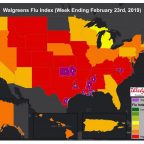Safety Tips To Keep Pets Healthy This Holiday Season
The holidays are full of family, fun and festivities – but they can also be a source of potential hazards for our cats and dogs. From increased stress levels to particularly harmful foods, the season’s activities can be a lot for pets to handle. Royal Canin, a global leader in pet health nutrition, is teaming up with actor and dog owner Justin Hartley to encourage pet owners to take precautions to ensure all pets remain safe and healthy.
Veterinarians see the same trends every year during the holidays – gastrointestinal issues such as an upset stomach and diarrhea rank among the top reasons owners take their pet to the vet. Here are some ways to avoid the risks, and keep your pet safe during the holidays:
- Avoid Human Foods: It’s no secret there are more treats around the house during the holidays, many of which can be especially harmful to pets. Guests may not realize that your dog or cat isn’t allowed to eat table scraps, or that they should keep all food and leftovers out of reach. A change in diet can cause an upset stomach, especially if introduced rapidly. Holiday foods that are particularly hazardous to pets include: chocolate, especially dark chocolate, unbaked bread dough, macadamia nuts, turkey, alcohol, sugar-free candy and baked goods that include artificial sweeteners.
- Deck the High Parts of the Halls: Holiday décor, such as tinsel, poinsettias, or pine needles, as well as drinking water from the tree stand can also be potentially dangerous for curious pets. If your pets nibble on the holiday greenery, the results can run from mild illness and irritation to kidney failure or worse. The poisoning effects of pine needles, mistletoe and holly are all fairly similar, ranging from vomiting, diarrhea, difficulty breathing, erratic behavior and even death. Keep pets away from the Christmas tree, and be sure to secure it against toppling over, just in case. Consider installing a barrier to keep pets away, or spraying the tree with a repellent such as Bitter Apple to keep cats from climbing.
- Minimize or Avoid Stressful Situations: The holidays aren’t just stressful times for humans, but pets, too! Pets are exposed to potentially overwhelming situations, such as boarding at a kennel, traveling, or being introduced to several new guests, which cause irregularity in routine and can lead to stress-related digestive issues. Any deviation from a pet’s normal behavior can be an indication of stress, such as: poor appetite, decreased interaction with their owners and gastrointestinal disturbances such as vomiting and/or diarrhea. Owners can minimize pets’ stress by providing a stable living environment and avoiding unpleasant interactions and experiences.
- Know How To Reach Your Veterinarian: If your pet’s routine is disrupted during the holidays, you may notice irregular digestive signs, and they could actually be signs of an infection, or a more serious condition. If your pet experiences any signs or vomiting and diarrhea, you should contact your veterinarian immediately to determine the best course of action. Signs of gastrointestinal issues include: vomiting, regurgitation, diarrhea, lethargy, tender abdomen and decreased appetite. Always keep these numbers posted in an easy-to-find location in case of emergencies:
- Your veterinarian’s clinic phone number
- 24/7 emergency veterinary clinic (if different)
- ASPCA Poison Control Hotline: 1-888-426-4435
- Talk To Your Veterinarian About Precise Nutrition: There are often simple solutions for many gastrointestinal signs pets experience. For example, the Royal Canin line of veterinary-exclusive GASTROINTESTINAL™ formulas provide multiple options for individualized nutritional solutions for cats and dogs experiencing gastrointestinal issues. Pet owners should talk to their veterinarian to determine which diet is most appropriate for their pet.
“Gastrointestinal issues such as vomiting and diarrhea are common in cats and dogs year-round, but can be especially common during the holiday season,” said Dr. Catherine Lenox, a veterinary nutritionist and Royal Canin Scientific Affairs Manager. “When there is additional stress such as house guests or boarding, as well as more food around the house – including foods that humans can eat but that are toxic to pets – there is an increased risk of gastrointestinal disturbances in our pets.”
Visit www.RoyalCanin.com or www.MyPetReference.com for more information on safety tips and pet digestive issues.






